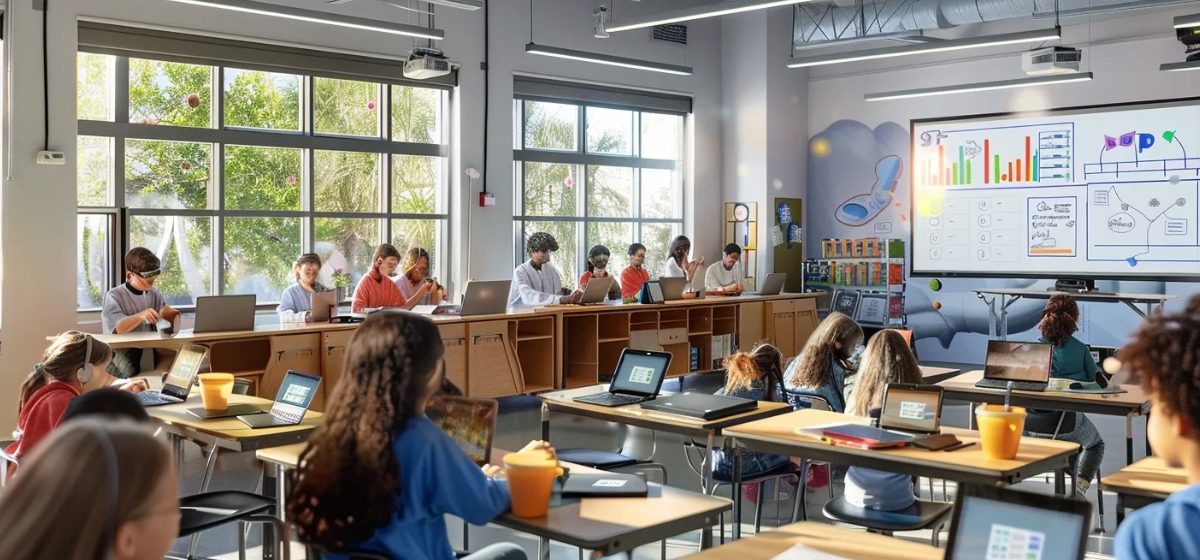The landscape of education is undergoing a profound transition, with artificial intelligence injecting unprecedented levels of information analysis and adaptive learning into the academic sphere. As technology gains a foothold in classrooms, it alters how teachers deliver their lessons and how students absorb knowledge. AI's capacity to harness data has opened new pathways for personalized education, making learning a more tailored experience for each individual. Teachers are finding these tools invaluable for enhancing their teaching effectiveness and helping to pinpoint student needs with greater accuracy. Keep reading to uncover how AI's role in education is redefining the learning experience for both teachers and students alike.
How Artificial Intelligence in Education Influences Teaching Effectiveness
The infusion of artificial intelligence into educational spheres is reshaping the fabric of how knowledge is disseminated and absorbed. My exploration of this technological integration reveals a remarkable leap in teaching effectiveness. With AI tools at their disposal, educators are witnessing a substantial uptick in their productivity, allowing them to concentrate on teaching complexities beyond administrative duties. Through the employment of data analytics, I've seen firsthand how learner experiences are becoming increasingly tailored, fostering environments where individual student needs are recognized and addressed. Moreover, I observe educators leveraging intelligence acquired from real-time analytics to fine-tune their teaching approaches, benefiting from immediate feedback to reinforce successful strategies and rectify teaching methods that fall short. In our journey toward optimal distance education, maintaining a vigilant stance on the ethics of educational technology is paramount; it's my ongoing commitment to ensuring that the digital advancements we adopt serve to enrich the learning landscape, not compromise it.
Enhancing Teacher Productivity With AI Tools
My involvement in the education sector allows me to witness how the landscape of teaching is being transformed through AI, primarily by offloading routine tasks. A virtual assistant, powered by artificial intelligence, is capable of handling grading, scheduling, and even responding to student inquiries, which affords teachers more time for research and strategizing impactful lesson plans. This uplift in productivity is a direct result of the accessibility features these AI tools provide.
In my experience, the impact of AI on education has not just streamlined teachers' work but has crucially broken down barriers to information. Seamless access to a wealth of internet resources enhances the potential for learning, allowing teachers and students alike to retrieve, assimilate, and apply knowledge far more efficiently. Teachers can now reach students with various learning needs through adaptive technologies, ultimately setting a firm ground for greater accessibility and inclusion in the classroom:
- Streamlining administrative tasks to focus more on teaching quality
- Providing instant access to internet resources and academic research
- Incorporating adaptive tools for a more inclusive learning approach
Tailoring Learning Experiences With Data Analytics
My recent consulting work with a Master of Business Administration program showcased the impact of AI on education, specifically through the use of data analytics. By analyzing students' learning patterns, AI platforms identified areas where attention was needed, allowing educators in higher education to customize learning experiences to each student’s strengths and challenges.
| Aspect | Before AI Implementation | After AI Implementation |
| Teaching Customization | Generic lessons aimed at the average student | Individualized attention based on unique learning data |
| Progress Assessment | Periodic, often lagging behind student's current needs | Continuous, allowing immediate adjustment and support |
| Engagement Strategies | Standardized, less adaptive to student preferences | Dynamic, responsive to engagement levels and feedback |
The deployment of artificial intelligence within educational institutions is indeed transformative. For instance, using artificial intelligence to evaluate student engagement and comprehension in real-time provides instructors in higher education with actionable insights. These insights empower them to adapt their teaching style on the fly to maintain student interest and facilitate deeper understanding.
Providing Real-Time Feedback to Improve Teaching Methods
In my role as an educator, I've found that one of the most compelling aspects of using generative artificial intelligence is its capacity for providing real-time feedback. This immediate input is vital for adjusting teaching methods to better align with student comprehension, ensuring that the experience is conducive to attaining Sustainable Development Goal 4: quality education for all.
- Incorporating generative AI for immediate feedback
- Aligning teaching strategies with SDG 4
- Enhancing the educational experience
The practical application of theory in the classroom is profoundly amplified by the use of artificial intelligence. I consistently leverage these tools to adapt my instruction based on the knowledge students demonstrate during lessons, allowing for a more responsive and effective teaching environment.
How AI Is Shaping the Future of Education
The landscape of education is undergoing a significant evolution, and at the core of this transformation is the integration of artificial intelligence. As we advance, AI becomes a pivotal tool, enhancing the learning environment by introducing smart content that revolutionizes classroom engagement. Not only does it cater to the general needs of the classroom, but AI's adaptive learning systems are also agile enough to meet the nuanced requirements of individual students. These tailored educational experiences emphasize critical thinking and personal growth, while AI's predictive analytics are fine-tuning our ability to forecast learning outcomes and fortify educational strategies. The sophisticated use of policy in the deployment of AI mitigates any potential bias and ensures that language barriers do not impede a student's access to quality education. This integration of artificial intelligence in education is clearly not a fleeting trend but a deeply transformative force charting the future of teaching and learning.
Revolutionizing Classroom Learning Through Smart Content
My active engagement with computer-assisted learning continues to provide compelling examples of how smart content is drastically changing classroom dynamics. Through the use of AI-generated materials, instant feedback on student work is possible, mitigating the risk of learners falling behind and ensuring concept mastery.
My interactions with various educational chatbot applications shine light on the profound innovation at play within the realm of education. These AI-powered tools extend beyond mere automated responses, actively engaging learners in conversations that foster a deeper connection with the subject matter, all while providing personalized educational support.
Enabling Adaptive Learning Systems for Individual Needs
The burgeoning field of machine learning is a cornerstone in the development of adaptive learning systems that dynamically adjust to the varying skills and learning paces of individual students. Intelligent tutoring systems, underpinned by machine learning algorithms, meticulously discern student performance data to deliver personalized guidance and exercises.
Virtual reality is revolutionizing the educational sphere by providing immersive experiences that transcend traditional learning boundaries, fostering creativity and enhancing skill acquisition. These experiences are tailored to individual learners, ensuring that each student can flourish in an environment conducive to their unique learning style:
- Machine learning refines intelligent tutoring systems for individualized learning paths.
- Virtual reality opens new avenues for creativity and skill development through personalized scenarios.
As I engage with educators and technology specialists, our discussions often revolve around how artificial intelligence catalyzes the fusion of creativity and technology in education;essentail aspect of creating bespoke learning landscapes that resonate with both teachers and students alike.
Predicting Learning Outcomes to Guide Educational Strategies
Predictive algorithms are fundamentally redefining the learning environment, enabling a proactive approach to education. By analyzing performance data, these algorithms anticipate individual learning outcomes, guiding my instructional strategies to preemptively address gaps in comprehension before they manifest as critical hurdles.
Safeguarded by stringent security protocols, the automation of outcome predictions steers clear of unnecessary surveillance, instead focusing on nurturing a supportive educational setting. It's evident in my practice that this insightful blend of foresight and discretion empowers educators and students alike with the tools for success, without compromising personal privacy.
Does AI Benefit or Hurt the Field of Education?
The dialogue around artificial intelligence and its place within our educational systems is intensifying, with its role in the evolution of learning and teaching at the forefront of pedagogical discourse. I've seen how AI can forge deeper student engagement, effectively weaving through the curriculum as it appeals to the intricacies of the human brain. As an expert in the field, I'm compelled to weigh the unmistakable positives against the ethical quandaries that surface alongside machine intelligence. The juxtaposition of algorithmic precision with the nuance of human mentorship invites a vital conversation about the intersection where reality meets virtual assistance. This equilibrium is where we, as educators, strive to balance technology's efficiency with the irreplaceable value of human interaction – the heart of the learning experience.
Assessing the Positive Impacts of AI on Student Engagement
In evaluating the advantages brought forth by artificial intelligence in education, I've observed notable advancements in student engagement techniques. Through AI-driven management systems, the methodology behind crafting engaging content has drastically improved, resulting in educational material that captures human interest and sustains attention more effectively than traditional methods.
These dynamic AI tools also assist in the personalization of learning, which is particularly relevant in subjects requiring complex problem-solving skills, such as those in the economy and science sectors. Additionally, in my experience, AI has enriched writing courses by offering real-time suggestions and critiques, shaping students into better writers through consistent, personalized interaction that wasn't possible at such scale before.
Evaluating the Ethical Considerations and Challenges
Amid the rapid integration of AI into the education market, the burgeoning use of data analysis to customize student learning experiences ushers in a host of ethical questions. One pressing concern is the security and privacy of the vast amounts of personal data being analyzed; it is my responsibility to ensure that the design of these systems upholds stringent privacy standards.
Furthermore, the rise of intelligent platforms brings the challenge of plagiarism into sharp focus. As an educator, I am tasked with discerning the authenticity of student work in an environment where AI assistance is readily available. It's imperative for both the creators and users of these technologies to question and establish boundaries to maintain academic integrity.
Balancing Technology and Human Interaction in the Classroom
In my work, I frequently address the need to balance sophisticated technology like large language models with the irreplaceable element of human touch in education. While AI enables personalized learning at scale, it's essential that the conversation between student and teacher remains at the heart of the lesson plan to maintain genuine student engagement.
The integration of AI tools in my teaching has certainly elevated the educational experience, but I am careful to ensure that these advancements never overshadow the personal mentorship that fosters deep learning. Establishing a harmonious blend of interactive AI and human-guided discovery within the classroom continues to be a pivotal aspect of my teaching philosophy.
How Can AI Disrupt Education?
Artificial intelligence's footprint in the educational landscape is not merely stepping, but indeed imprinting deeply, disrupting traditional teaching and learning methodologies. Personalizing learning at an unprecedented scale, AI is crafting curricula that cater uniquely to each learner, a feat unattainable by human capabilities alone. Not to be eclipsed, the role of teachers is morphing as intelligent assistants take on administrative and evaluative duties, creating a pathway for educators to focus more intently on the nuanced art of teaching. Delivering content has transcended past boundaries through immersive technologies like virtual and augmented reality, transporting mathematics, languages, and sciences from abstract concepts into tangible experiences. Amid these promising advancements, my vigilance over data security remains unwavering, ensuring that the digital evolution in education is underpinned by robust protection of sensitive information. With AI's sophisticated natural language processing abilities fine-tuning the precision of communication, a deeper understanding is being unlocked for both teachers and learners, heralding an era of unprecedented potential in reshaping education.
Personalizing Learning at an Unprecedented Scale
Personalized learning facilitated by AI is swiftly changing the dynamics of education, preparing students more effectively for the workforce. By integrating systems of adaptive learning, the individual potential of each student is maximized, leading to enhanced productivity and a more competitive skill set for an increasingly automated economy.
Adaptive learning technologies are refining the way we approach literacy and comprehension in the classroom. Rather than a one-size-fits-all exam preparation, artificial intelligence creates customized learning paths that dynamically adjust to the proficiency levels and learning speeds of students, promoting a deeper and more personalized understanding of the subject matter.
Redefining the Role of Teachers With Intelligent Assistants
In the evolving landscape of education, augmented reality is not the only technology altering the educator's toolkit; intelligent assistants are redefining the traditional scope of teaching responsibilities. Teachers are finding themselves orchestrating a digital symphony, where AI aides harmonize lesson planning and grading, granting them more time to fuel the motivation that drives student success.
As intelligent assistants become more integral to the educational process, their capacity to reshape learning environments extends to fostering stronger collaboration, even among students with disabilities. The support from AI technologies ensures that the diverse needs of learners are met, affirming my belief that the potential of every student is honored and nurtured in the modern classroom.
Transforming Educational Content With Virtual and Augmented Reality
The debate around emerging technologies in education often centers on their potential to change student behavior and engagement. Virtual and augmented reality, particularly under a creative commons license, provide rich, immersive experiences that encourage a deeper understanding of complex concepts, driving home the significance of active participation and problem solving in a virtual setting.
In my career as an educator, I have seen virtual and augmented reality tear down the walls of traditional classrooms, engendering a new type of content that stimulates both the intellect and the senses. These technologies not only foster innovative approaches to problem solving but also invite students to step into scenarios that were once confined to the imagination, thus revolutionizing the learning process.
How Does AI Help Teachers?
Artificial Intelligence has ushered in a new era for education, one where the roles and responsibilities of educators like myself are undergoing a dramatic transformation. As a professor deeply involved in computer science, I have seen the advent of AI-powered tools not only enhance the educational process but also vastly improve the efficiency of teaching. By automating routine administrative tasks, I have more time to dedicate to the core aspects of teaching. Customizing resources to support the diverse learning styles of students is now more manageable with systems that adapt to each learner's unique needs, which can be particularly beneficial when incorporated into mobile apps used in the classroom. Moreover, AI provides valuable insights that facilitate my ongoing professional development, simulating scenarios for me to refine my instructional strategies. Through integrated computer programs, teaching is becoming not only more effective but also more aligned with the dynamic pace of contemporary learning.
Automating Administrative Tasks to Free Up Teaching Time
The impact of artificial intelligence on administrative efficiency cannot be overstated; as an educator, I have witnessed a significant shift in how we manage our educational responsibilities. AI has empowered me and my fellow education leaders to delegate routine tasks like attendance tracking and paperwork management, thereby carving out more time to dedicate to specialized aspects of teaching and curriculum development.
With AI efficiently handling the nuts and bolts of education administration, I find there's a fresh opportunity to channel my efforts into crafting learning experiences that are truly transformative. This shift in resource allocation allows for the deeper involvement in students' academic progress and the luxury of more personalized interactions, which are critical for fostering an engaging educational environment.
Supporting Diverse Learning Styles With Customized Resources
AI has been instrumental in my efforts to provide quality education by developing resources that cater to a spectrum of learning preferences. With algorithms designed to modify content based on individual progress, I ensure that every student receives instruction that aligns with their unique learning pace, enabling them to grasp complex subjects like electricity, which require tailored educational approaches.
I maintain transparency in pedagogy by employing AI to track and communicate the progress of each student in an accessible manner. This transparency not only boosts students' confidence in managing their learning journey but also allows me to continuously refine my teaching strategies to meet their evolving educational needs.
Facilitating Ongoing Professional Development Through AI Insights
The evolution of professional development in education is tightly linked with advanced AI-powered analytics. As a dedicated educator, I turn to AI for personalized insights into teaching methodologies, with search engines serving as my gateways to contemporary pedagogical trends and concepts.
AI-driven analysis tools have become a cornerstone of my continuous improvement, shedding light on unintentional biases and discrimination in my teaching materials and approaches. This ability to scrutinize and refine my practices not only fosters a fairer learning environment but also empowers me to stay ahead in the evolving landscape of education:
| Professional Development Aspect | Impact of AI-Driven Insights |
| Pedagogical Trends | Search engines and AI analytics identify and integrate latest teaching concepts. |
| Unbiased Education | Analysis tools spotlight and help mitigate discrimination within teaching content. |
| Improvement Strategies | Data from AI empowers targeted refinement of teaching methods. |
What Is the Role of Artificial Intelligence in Teaching and Learning?
The role of artificial intelligence in education extends far into shaping our future, setting the goal of enhancing traditional teaching techniques with sophisticated AI tools. These digital aids are reimagining the way educators and students interact, fostering a deeper level of collaboration and creativity within learning environments. My embrace of AI-powered platforms has not only enriched the curriculum with elements of gamification but also transformed my approach to tracking student progress. Enhanced by AI, I can adjust my instructions dynamically, ensuring optimal learning outcomes. As I incorporate these innovations, I often consult and add to a growing body of research, evidenced by a plethora of citations in my published works and shared pdf resources, all aimed at broadening our understanding of AI's capacity to augment education.
Complementing Traditional Teaching Techniques With AI Tools
The integration of AI into educational practices is crossing boundaries previously thought unassailable, narrowing the digital divide that separates learners of different backgrounds. In entrepreneurship courses, for example, AI-facilitated simulations enable students to engage in virtual business scenarios, where gender representation and equality can be consistently analyzed and promoted.
With the advent of AI, teaching traditional subjects has transcended classrooms, reaching learners via their smartphones. Robots, now able to guide language acquisition with nuanced, conversational AI, provide an interactive, responsive experience that adapts to the learner's pace, reinforcing language skills more effectively than traditional drills ever could.
Fostering Collaboration and Creativity Through Enhanced Learning Environments
My experience with employing AI in the classroom has led me to appreciate its power in building communal knowledge. A quiz engine I recently integrated under an educational license boosts synergy among students, as they collaborate on history assignments, enriching their understanding through shared insights and collective problem-solving.
Expanding on this collaborative ethic, the system I use engages students in re-enacting historical events, fostering a creative space for them to explore the depth of the past. This experiential learning, made possible by AI, not only helps cement their grasp of history but also encourages innovation and teamwork, integral components of today's learning environment.
Tracking Progress and Adjusting Instructions for Optimal Learning Outcomes
In steadfastly monitoring student advancement, the judicious handling of personal data is paramount to me. As we harness sophisticated AI systems in education, protection and ethical use of this information is imperative for sustainability in the digital learning space.
Organization of curriculum has been enhanced through data science, enabling a more fluid and responsive education model. By tracking students' progress meticulously, algorithms allow for real-time adjustments in instruction, supporting a learning journey tailored to individual needs and potential.
| Education Component | Traditional Approach | AI-Enhanced Approach |
| Data Protection | Personal data managed with limited security | Advanced encryption and ethical use protocols |
| Curriculum Organization | Rigid and linear structures | Dynamic, adaptive, and responsive frameworks |
| Instructional Adjustments | Periodic and retrospective updates | Immediate and proactive changes |
Pioneering in the educational field, I am constantly seeking avenues for growth and discourse, hence my recent venture into sharing reflections and insights on a podcast. Such platforms enable me to explore the intersection of technology and pedagogy, emphasizing the role of AI in cultivating environments of continuous growth and learning.
Conclusion
Artificial intelligence is revolutionizing education by enhancing personalized learning and redefining teachers' roles, allowing them to focus on more impactful aspects of teaching. Through its ability to provide real-time feedback and predictive analytics, AI supports educators in tailoring their instruction to improve student outcomes. However, the application of AI in education requires careful consideration of ethical implications, particularly concerning privacy and the preservation of human interaction. As we integrate AI into teaching practices, it is vital to maintain a balance between technological efficiency and the irreplaceable human elements that foster deep learning.
.png#387)





